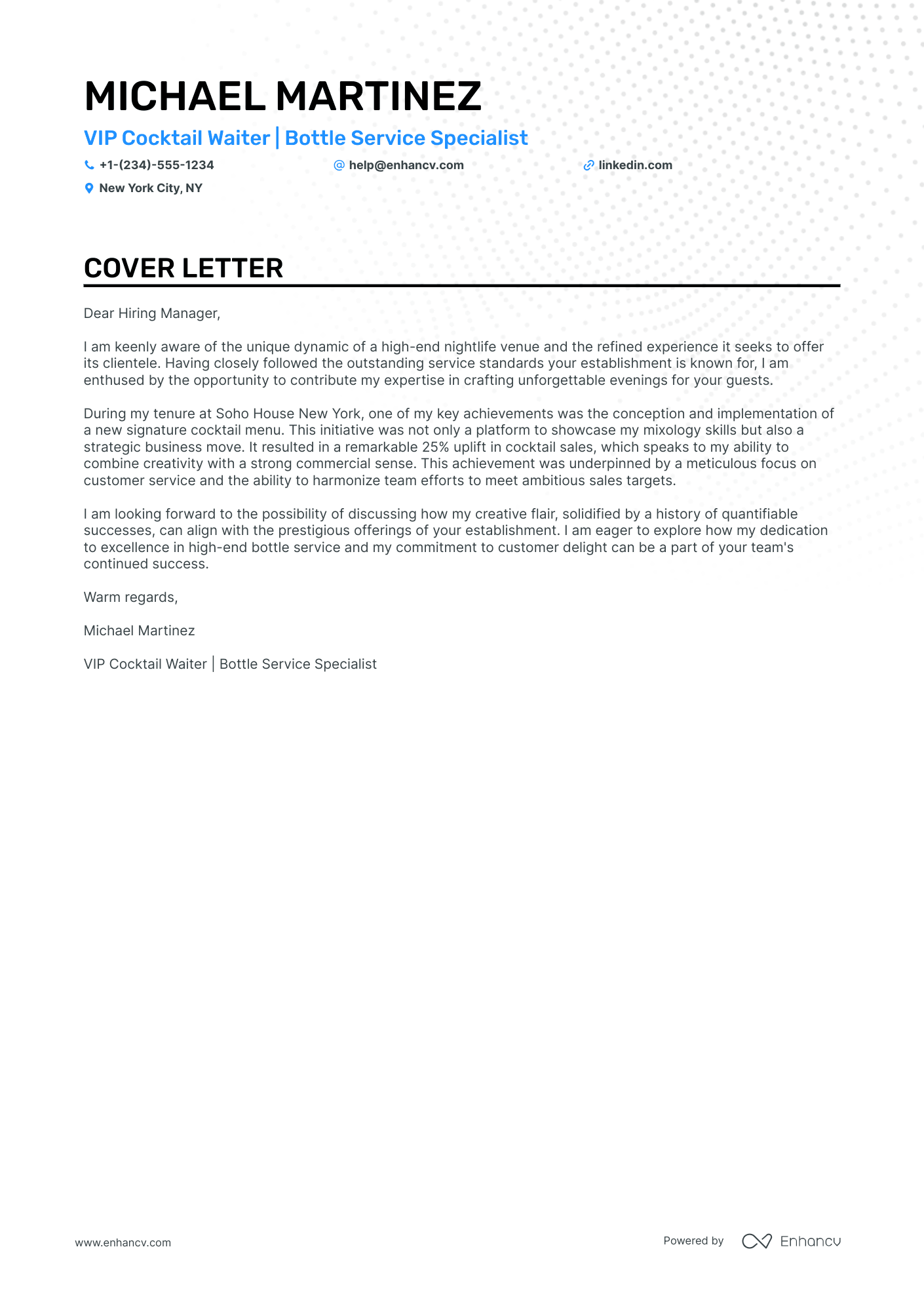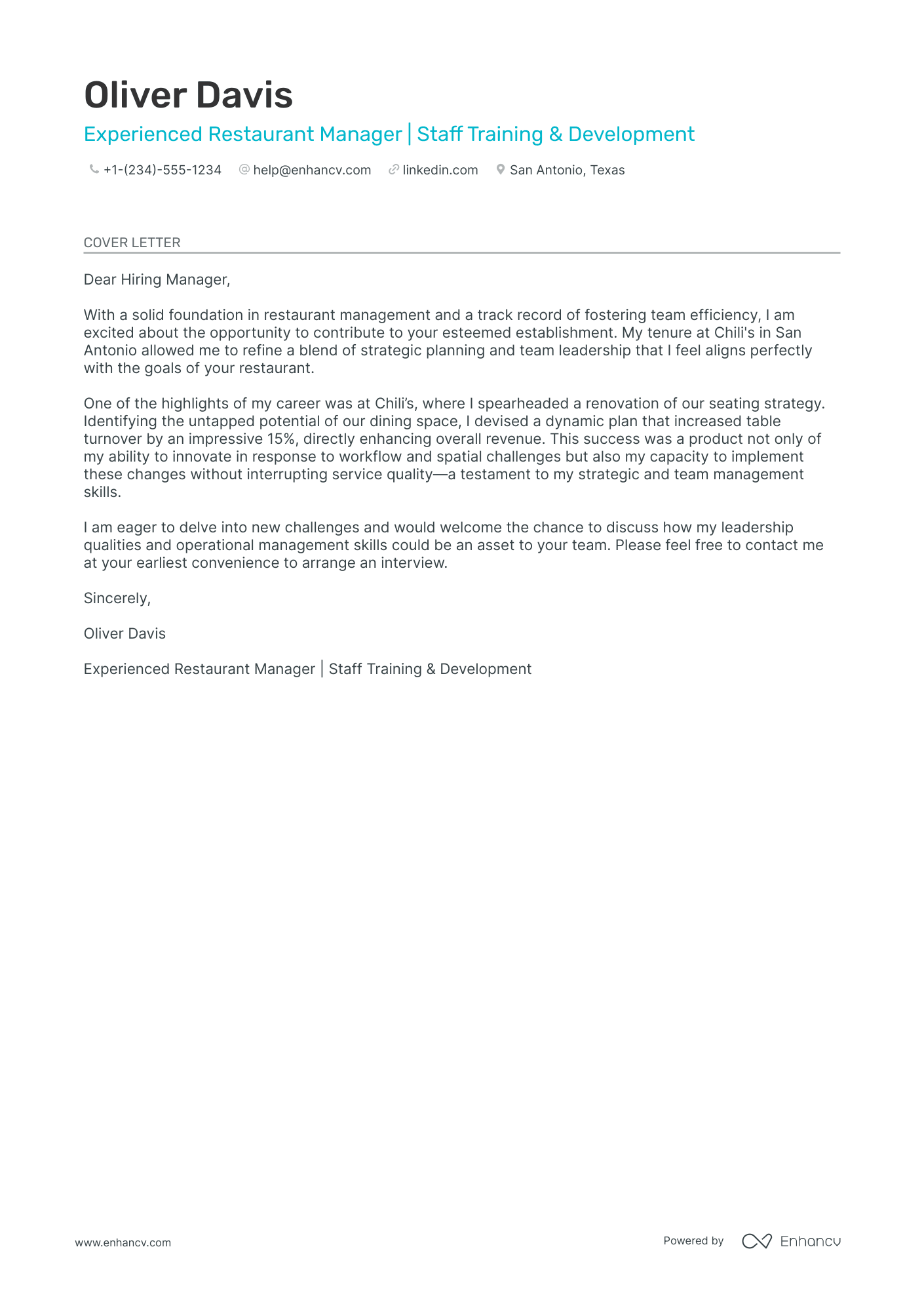Embarking on your job hunt, you’ve learned that a carefully crafted hostess cover letter can set you apart. The challenge? Not to regurgitate your resume but to weave a compelling story around your proudest professional moment. Striking the delicate balance between formality and originality, without dipping into clichés, is key. And remember, brevity is your ally—aim to keep your cover letter to a singular, impactful page. Let's unlock the secrets to creating your standout cover letter.
- Write a hostess cover letter that helps you stand out (and get the job);
- Understand how to start and end your hostess cover letter with the appropriate greeting;
- What to include in the body of your hostess cover letter to put your best foot forward;
- Your most important achievements - how to present them as part of your hostess cover letter.
And if you want to make your life even easier, simply drag and drop your hostess resume into Enhancv's AI cover letter generator, and it will write your cover letter for you in just a few moments.
If the hostess isn't exactly the one you're looking for we have a plethora of cover letter examples for jobs like this one:
Drop your resume here or choose a file.
PDF & DOCX only. Max 2MB file size.
Hostess cover letter example
JACK ALLEN
Dallas, Texas
+1-(234)-555-1234
help@enhancv.com
- Demonstrating measurable achievements with specific metrics (e.g., "25% improvement in service efficiency," "20% reduction in staff turnover," and "30% increase in guest retention rate") underlines the candidate’s ability to deliver results and provides concrete evidence of their success in previous roles.
- Highlighting experience in the industry ("my tenure at The Capital Grille") and aligning with the potential employer's values ("commitment to excellence") helps establish credibility and shows the candidate's understanding of the job requirements and company culture.
- Discussing the implementation of training programs addresses the candidate's capability to innovate and lead change, which is advantageous for a management position as it shows foresight and a commitment to continual improvement.
- Mentioning staff management and addressing staff turnover connects the candidate's people management skills with direct operational outcomes, a crucial aspect for hospitality roles that rely on team performance for service delivery.
The must-have sections and format of your hostess cover letter
When writing your hostess cover letter, keep in mind that it'll only be read by the recruiters and not the Applicant Tracker System (or software used to assess your profile). That's why you should structure your content with a/an:
- Header (apart from your contact information, include your name, the role you're applying for, and the date);
- Personalized salutation;
- Opening paragraph to win the recruiters over;
- Middle paragraph with key details;
- Closing that starts from clichés;
- Sign off (that's not mandatory).
Industry standards dictate your paragraphs to be single-spaced and to wrap your content in a one-inch margin. Designing your hostess cover letter, refer to one of our templates, which automatically takes care of the spacing and margins.
Choose the same font for your hostess cover letter as you did for your resume: the likes of Lato and Bitter would help you to stand out in a sea of cover letters in Arial or Times New Roman.
Export your whole hostess cover letter from our builder in PDF to keep the same formatting and image quality.
Don’t let cover letters slow you down. Use our free cover letter generator to create one in no time.
The top sections on a hostess cover letter
- Header: This section includes your personal contact information (name, phone number, email, address), the date, and the employer's details; it's essential for providing the recipient with an easy means of identifying and contacting you.
- Greeting: Personalize the greeting by addressing the hiring manager or the team directly, which shows attention to detail and a genuine interest in joining the hospitality staff.
- Introduction: Highlight your passion for the hospitality industry and any direct experience you have as a hostess, setting the stage for the reader to learn about your suitability for the role.
- Body: Discuss specific skills such as multitasking, customer service excellence, and the ability to work in a fast-paced environment, citing examples from your experience that demonstrate how you've excelled in similar settings.
- Closing: Reiterate your enthusiasm for the opportunity to contribute to their team, invite them to review your attached resume, and express your eagerness to discuss how your skills and experiences align with the restaurant's needs during an in-person interview.
Key qualities recruiters search for in a candidate’s cover letter
- Excellent customer service skills: A hostess is often the first point of contact for customers, so the ability to provide friendly and attentive service is crucial.
- Strong organizational skills: Managing reservations, waitlists, and seating arrangements requires an ability to keep things orderly and efficient.
- Effective communication abilities: Communicating clearly with both customers and staff members ensures smooth operation and customer satisfaction.
- Ability to multitask and work under pressure: Hostesses must handle multiple tasks at once during busy hours while maintaining composure.
- Experience with reservation and seating software: Familiarity with industry-standard software helps streamline the process of managing guest flow.
- Pleasant and professional demeanor: As the face of the establishment, a hostess must present a welcoming and professional image at all times.
The hostess cover letter salutation: how to address hiring managers
After covering the format of your hostess cover letter, let's look at the salutation.
Back in the day, the cordial "To whom it may concern" or "Dear Sir/Madam", might have worked out fine.
But, nowadays, your cover letter should approach hiring managers on a more personal basis.
So, what to do about your cover letter salutation?
If you've messaged the recruiters and are on a first name basis or a more formal one, use the hiring manager's name in the greeting (e.g. "Dear Sophie," "Dear Ms. Givens", or "Dear Mr. Everett,").
Always aim to make the effort to find out the name of the hiring manager, who'd be assessing your application. Search on LinkedIn, double-check the advert on the corporate website, or message the brand on social media to find out more about the role.
If you can't find the hiring manager's name (and still want to sound professional), use "Dear HR Team,", "Dear Hiring Manager,", or the likes.
List of salutations you can use
- Dear Hiring Manager,
- Dear [Restaurant Name] Team,
- Dear [Manager's Name],
- Dear [Mr./Ms. Last Name],
- Dear [Director of Hospitality],
The hostess cover letter introduction: focusing on your unique value, with a creative twist
You are not the only one wondering how to start your hostess cover letter. Those first two sentences introduce your profile and should be memorable.
No pressure.
When beginning your hostess cover letter, immediately point out the unique value of working with you. In other words, what you promise to bring to the role by using your past track record of success.
Start your hostess cover letter with a creative twist by telling a joke or stating something relatable. Select this type of introduction only if it aligns with the company culture.
How to write an achievement-focused hostess cover letter body
We've got the intro and greeting covered. Now, comes the most definitive part of your hostess cover letter - the body.
In the next three to six paragraphs, you'd have to answer why should recruiters hire you.
What better way to do this than by storytelling?
And, no, you don't need a "Once upon a time" or "I started from the bottom and made it to the top" career-climbing format to tell a compelling narrative.
Instead, select up to three most relevant skills for the job and look back on your resume.
Find an achievement, that you're proud of, which has taught you these three job-crucial skills.
Quantify your accomplishment, using metrics, and be succinct in the way you describe it.
The ultimate aim would be to show recruiters how this particular success has built up your experience to become an invaluable candidate.
Finishing off your hostess cover letter with what matters most
So far, you've done a fantastic job in tailoring your hostess cover letter for the role and recruiter.
Your final opportunity to make a good impression is your closing paragraph.
And, no, a "Sincerely yours" just won't do, as it sounds too vague and impersonal.
End your hostess cover letter with the future in mind.
So, if you get this opportunity, what do you plan to achieve? Be as specific, as possible, of what value you'd bring to the organization.
You could also thank recruiters for their interest in your profile and prompt for follow-up actions (and organizing your first interview).
Keep this in mind when writing your zero experience hostess cover letter
Even though you may not have any professional experience, your hostess cover letter should focus on your value.
As a candidate for the particular role, what sort of skills do you bring about? Perhaps you're an apt leader and communicator, or have the ability to analyze situations from different perspectives.
Select one key achievement from your life, outside work, and narrate a story that sells your abilities in the best light.
If you really can't think of any relevant success, you could also paint the picture of how you see your professional future developing in the next five years, as part of the company.
Key takeaways
Writing your hostess cover letter doesn't need to turn into an endless quest, but instead:
- Create an individual hostess cover letter for each role you apply to, based on job criteria (use our builder to transform your resume into a cover letter, which you could edit to match the job);
- Stick with the same font you've used in your resume (e.g. Raleway) and ensure your hostess cover letter is single-spaced and has a one-inch margin all around;
- Introduce your enthusiasm for the role or the company at the beginning of your hostess cover letter to make a good first impression;
- Align what matters most to the company by selecting just one achievement from your experience, that has taught you valuable skills and knowledge for the job;
- End your hostess cover letter like any good story - with a promise for greatness or follow-up for an interview.
Hostess cover letter examples
By Role







